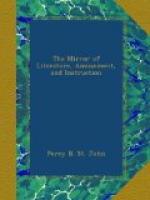But, with all these high acquirements, he was not a happy man. He had been baptized in the waters of melancholy; and a circumstance which occurred in the fifth year of his curriculum had a baleful and, ultimately, a fatal effect upon him, dethroning reason from its lofty seat, and plunging not him only, but another estimable individual, in the deepest distress. This circumstance, painful as it is, we must relate; and, on perusing it, the reader will see that the noble aspirations, the keen susceptibilities, of the mind do not always lead to happiness; for, alas! it was such an excess of susceptibility in his intellect which disturbed so sadly the current of his ideas, and made him an inmate of St. Luke’s.
The weather at the period we speak of was truly melancholy. It was in the gloomy month of November,—that month in which it is said the suicidal propensities of the English nation are most strongly in force. The air was either filled with dull, sluggish, unwholesome fogs, which hung upon it like a nightmare, or soaked in a constant drizzle of small, annoying, contemptible rain-drops, which, without possessing the energy and dignity of a shower, were infinitely more disagreeable, and found their way to the flesh in spite of all the protective armoury of great-coats, hessian cloaks, or umbrellas. It seemed as if a wet blanket were drawn between the sun and the earth. The atmosphere was always foggy, often perfectly wet, but never thoroughly dry. It wanted vitality; and every person that breathed it partook of its own damp, hypochondriac, inanimate character.
It was in the morning of one of those days of fog, gloom, and ennui, that Augustus last sallied out to lounge about the streets of Oxford, as was his custom, before breakfast. There was a favourite spot in which he was wont to walk; it was upon the footpath of a very short street, about the middle of which stood the shop of Jonathan Hookey, a barber. This street (we forget its name) is not above fifty yards in length, and opens at each end into a cross street. Now, Merton’s walk extended from one of those cross streets to the other, including, of course, the whole extent of the short street; he always walked on one side of this street, viz. on that opposite to the barber’s shop. These particulars may seem trifling, but they are essential to the proper understanding of the story.
While making these morning perambulations, he had always an air of deep thought, his arms were crossed, and he kept his eyes constantly fixed upon the ground, as if deeply engrossed in profound meditation. It boots not now to inquire on what subjects his thoughts were mostly employed, but it was unquestionably on themes of deep import, and concerned not himself only, but the interests of science, learning, and humanity at large. The morning in question was peculiarly dull and foggy; but whether it was this or something else, certain it is, that he felt himself more than usually overpowered. The air oppressed him like a leaden shroud, and the energies of his soul seemed for once on the point of sinking beneath the superincumbent burden.




